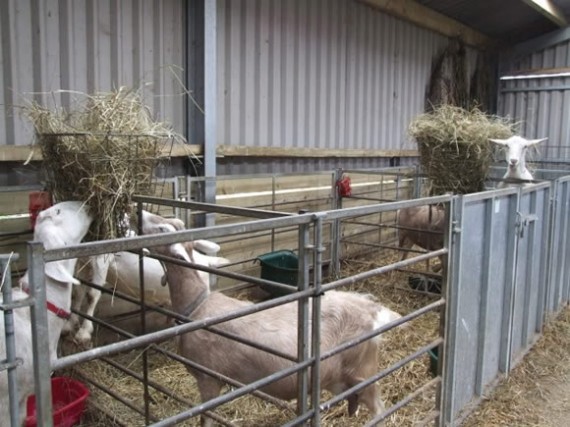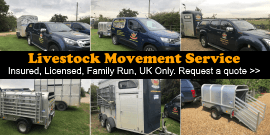Starting with Goats
Goats are a great addition to any smallholding, and can provide milk, meat or a combination of both. They are ideal for a smaller plot, as they take up less room than cows, and are much more easily handled. Goats were the second animal after dogs to be domesticated by humans, and as a result they are very friendly, inquisitive animals, which also makes them good pets as well.
For welfare reasons, it is recommended to not keep one goat on its own, but to have at least two as they are herd animals.
 Warning - one goat can lead to another.
Warning - one goat can lead to another.
I have to recommend as a starting point doing as much research as you possibly can. Find out about the different breeds and kinds of goat first, then ideally try and get in touch with a local goat keeper. Nothing is better than seeing with your own eye's how the animals behave, and how they are handled and looked after.
Registering your holding and herd
Before getting any goats, you need to deal with the legislative side. Keeping goats is no longer as straightforward as it used to be, and every herd and animal needs to be identified. Detail will vary from country to country, so we suggest you contact your local Department of Agriculture.
In Scotland, the relevant agency is the Scottish Government Rural Payments and Inspections Department (SGRPID).
In England, you need to contact the Rural Payments Agency, an executive agency of DEFRA.
From them, you will get a County Parish Holding (CPH) number, also known as an agricultural holding number. If you buy or rent agricultural land, it may already have a CPH number, so do check.
Having got your CPH number, contact Animal Health, an executive agency of DeFRA that was formed from the State Veterinary Service and a number of other related inspectorates in 2007, and they will provide you with a Goat Flock Number.
Transportation or Movement of your goats
If you move goats from one holding to another, you must complete a movement licence.
In England and Wales this is form ARAMS-1, available from ARAMS (Animal Reporting and Movement Service). In Scotland, a Sheep and Goats Movement Document is available from the Scottish Animal Movement Unit (SAMU). Links to these documents can be found in the related sites section below.
This allows stock, and their movements, to be traced in the event of a disease outbreak. When you buy your first goats, the seller will complete a movement licence and give you a copy, so you will need your CPH number before buying. The licence must be retained for 6 years.
You must also keep a record of any movements on and off your holding, including:
- the date of movement
- Identifying number
- the number of animals
- the holding from which they were moved (name or responsible person, full address and CPH number
- the holding to which they were moved (name or responsible person, full address and CPH number)
Movements must be recorded within 36 hours of them taking place. Once a year you must record the maximum number of goats normally present on the holding. This record must be kept for six years after you stop keeping goats and can be in written or electronic format. Animal Health can visit your holding and ask to see these records at any time.
Medicine book
You will also need an animal medicine book. These are available from agricultural suppliers. All medicines, including wormers, must be entered in the book at the time they are administered. Many medicines have a withdrawal period, during which the animal cannot be slaughtered for human consumption. Check each medicine before you buy it as some can have withdrawal periods of 56 days or so.
Individual identification
By law, all goats require to be individually identified.
Identification must be by either, double eartags (one in each ear), or by eartag and tattoo.
- Eartags must be stamped or printed (not hand written) with the letters UK followed by the flock number and an individual animal number. For animals up to one year old, one eartag only may be used.
- Tattoos of the herd number (UK not required) and individual number are made on the ear.
The UK has successfully petitioned against goats having to use EID (electronic identifying eartags), and therefore ordinary eartags can be used.
Housing, vets and abattoirs
It is vitally important before you get any goats is to plan adequate shelter for them. Goats need access to shelter at all times, as their coats are not waterproof, and being out for too long in the wrong conditions can lead to pneumonia. Housing is covered in more detail in another section as well.
 Proper housing is essential for keeping goats.
Proper housing is essential for keeping goats.
Before getting your goats, it is a good idea to have established contact with your local veterinary practice. Bear in mind that not all veterinary practices treat farm animals, so do make sure you find one that does. Goats are not studied to a great extent when training for veterinary medicine, so it may be best to ask around local goat keepers to see which vet they use.
Also, bear in mind that many common animal medicines are not licensed for goats. In order for a license to be obtained, the medicine has to be extensively tested on the animal but due to the small numbers of goats in the UK, it is not always possible for every medicine to be licensed. Your vet will advise you if a product is not licensed, and will discuss with you if it is the best solution. Some vets will ask you to sign a disclaimer if they prescribe a medicine not licensed for goats.
If you are keeping meat goats, or rearing young goats for meat, make sure you establish how you going to have them slaughtered and butchered. Many abattoirs have closed and some don’t slaughter goats, so find out what is available locally.
- Next Goat Breeds »

About Beth Fairley
Beth's bio coming soon.
Further Reading
 Goat Health and Welfare: A Veterinary Guide David Harwood |  Goats: A Guide to Management Patricia Ross |  Diseases of the Goat John G. Matthews |  Goat Husbandry David Mackenzie |  The Goatkeeper's Veterinary Book Peter Dunn |
Smallholding shop
When you click links below and make a purchase, this may result in this site earning a commission from eBay.

Bleached Cotton Halter 8mm
Bleached Cotton Halter for… from £4.40 + p&p

Chestnut Crook each
Chestnut crook.… from £15.12 + p&p

6.5 single bow hand shear
Single bow for… from £22.48 + p&p

Myti Lyte Foot Rot Shear straight each
Myti Lyte Mk 111. Foot rot… from £14.59 + p&p












